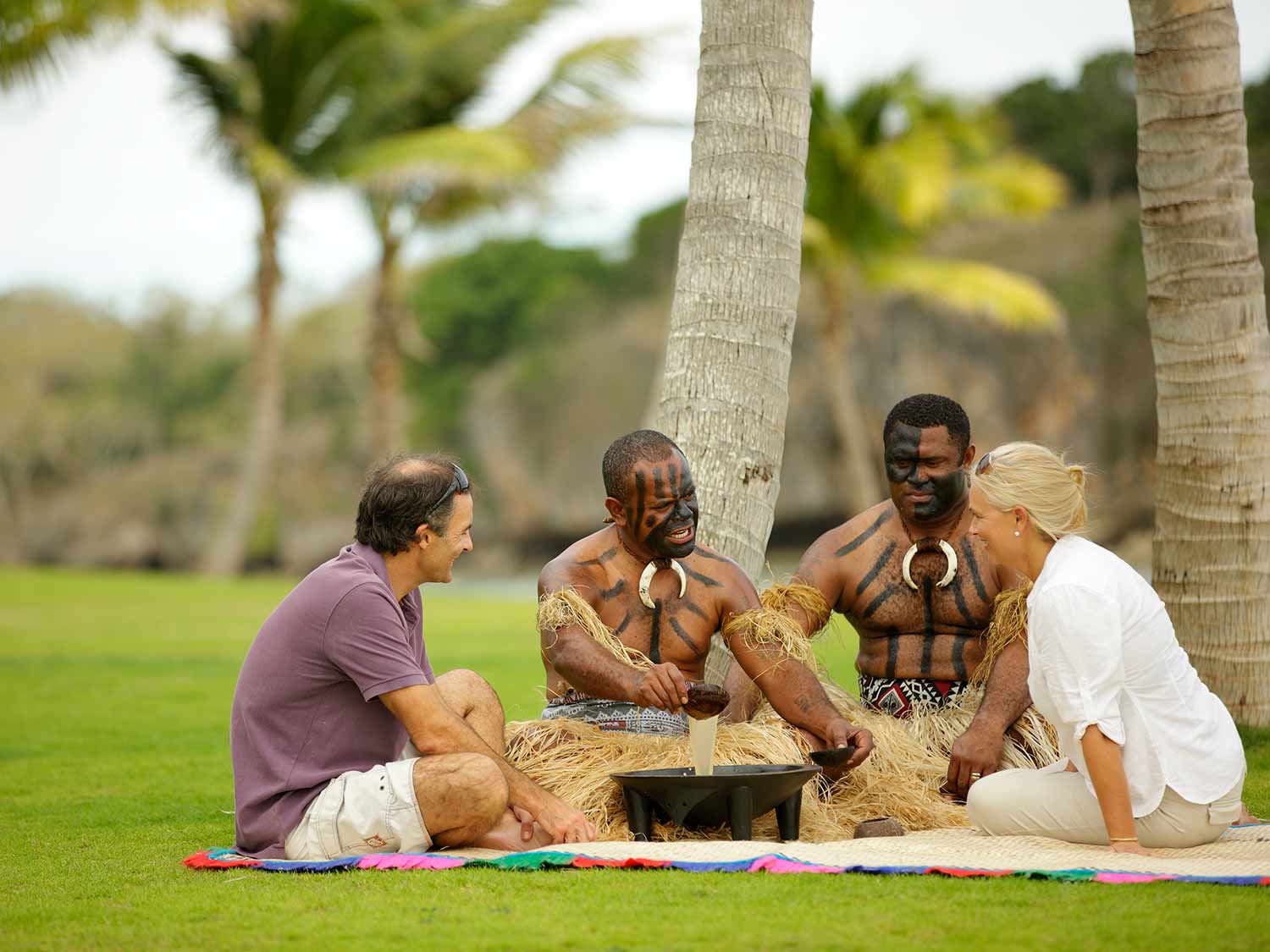10 Ways To Make The Most Of Fiji's Bula Culture
From village visits to lei making, the people of this South Pacific nation will extend a warm welcome—to those who know how to ask.
For many Americans, Fiji takes getting used to. Not the green of the islands or the turquoise of the waters, but the kindness of the people. Their welcoming spirit. Fijians are friendly in a way that many Westerners don't immediately understand.
This island nation still adheres to a village way of life, with a chief who makes sure everyone is looked after and has what they need. It's not a culture built on competition or getting ahead at someone else's expense. It's a culture of cooperation and connection—and travelers are certainly welcomed.
So, how can you get in the middle and make the most of this bula culture? Read on.
Say “yes” to village visits
Many resorts, such as Yasawa Island Resort, are one-island resorts, hiring the majority of their staff from the only village on island. The result is that their sense of family and community can be felt throughout the property.
Over the years, guests have been invited to the villages so much that it has become a regular offering for many Fiji resorts. It's common to see one or two village visits on the weekly schedule. If you're not sure which day it is, ask upon arrival so you don't miss out.
Says Hudson Mitchell, director of leisure sales and marketing for the InterContinental Golf Resort and Spa on Fiji's main island, "We pride ourselves in our village visits as we have an interactive relationship with our local community."
Ask to join whatever is happening at the village
Depending on the village, the island and the season, the day's activities could range from spear fishing to basket weaving, pottery making or shopping at the produce market.
Says Mitchell, "Your experience can be dependent on the cycle that the village is in, whether that cycle be by day—chores are based on time, especially early morning and mid-morning, or by season as some months are for planting and some are for sea harvesting, etc."
Sundays can mean church services. During the week, everyday tasks could be pounding kava to be consumed in the evening, weaving mats for a wedding or other ceremony, or making leis for an event.
Regardless of what the day brings, if you're open to it, integrating into the day of village life is perhaps the best way to get a feel for traditional Fiji culture.
Ask to hear the history of the village
Fiji is made up of 1,166 villages, each with its own history and slightly different ways of living.
"Wherever you go in Fiji, we recommend that you try and get someone to tell you the story of the people and village nearest you," explains Mitchell. "Each village has its own separate story, and these stories have been passed down from generation to generation. And, it's best to start by asking the elders rather than the young folk."
Bring school supplies
Typically, a classroom visit is part of your time at the village. The schoolchildren may even sing a few songs to honor your arrival.
If you have room in your luggage, one kind way to show appreciation for being welcomed on a school tour is to bring supplies: pencils, erasers, paper, markers, pads of paper, and the like.
"There is a real need for these items," says Susan Bejeckian who works with several Fijian resorts. "There is no Staples or Office Depot on these islands."
Adds Mitchell: "There are guests that like to give back to a local community. As such, we like to avoid the sugar rush and tooth decay that come with candy but rather opt for something more practical and educational."
Also just bring your camera
In many villages that rely on subsistence living, cameras and iPhones can be rare sightings. For kids, showing them selfies, photos and live video of themselves can be endlessly entertaining.
Says Mitchell, "A fully charged camera is what you need to have a good time."
Drink the kava
"Never turn down an offer for a kava session," offers Mitchell.
At many resorts, traditional kava sessions are organized at least once per week. Guests are taught the ceremonial process for accepting the kava bowl. But beyond the ceremony and tradition, it's akin to hanging out in a neighborhood bar at home.
"Most Fijians will relax around the kava bowl with at least a number of guitar players and storytellers to help relax the evening away," he adds.
Get ready to sing
Whether it's kava night or a cultural night at the resort, singing is a part of most Fijian events. Luckily, most songs have a lot of repetition, making it easy to join in. Clapping is a part of most songs as well.
"Fijians will encourage you," says Bejeckian. "Partake—don't just sit back and listen."
Follow Fiji etiquette
Fiji is a place of tradition, and as such, there are a few etiquette rules to observe:
- Remove hat and sunglasses before entering a village.
- Don't touch another person's head.
- Ladies should not expose shoulders or knees, and are also forbidden from wearing pants, tights or leggings.
- Do not talk, stand or kneel during a kava ceremony or when you are in a house during a formal event.
- Do not talk negatively about church or religion.
- Do not take photos unless given express permission.
- Do not point when referencing someone.
Research the culture
Fiji's traditions and etiquette extend beyond what can be covered here. One good source to learn more is the Fiji Tourism site.
"The ability to understand the Fijian taboos, habits, nuances and everyday living can make all the difference in a guest's experience," says Mitchell.
Get off the beaten track and speak to a local
Yes, you can do all of the above, but the best adventure might be to mix and mingle and see where Fiji takes you.


